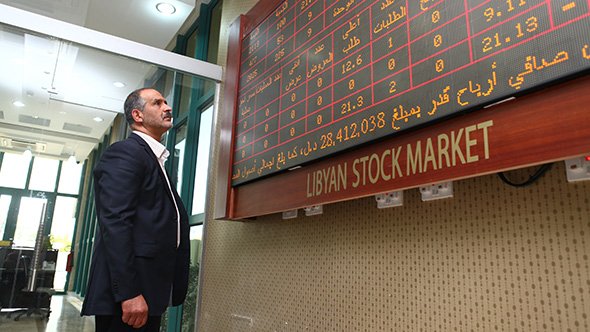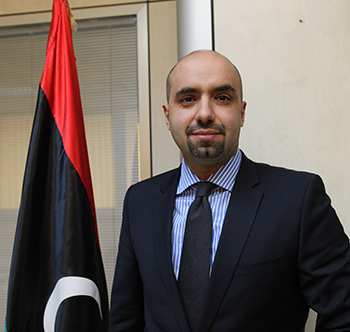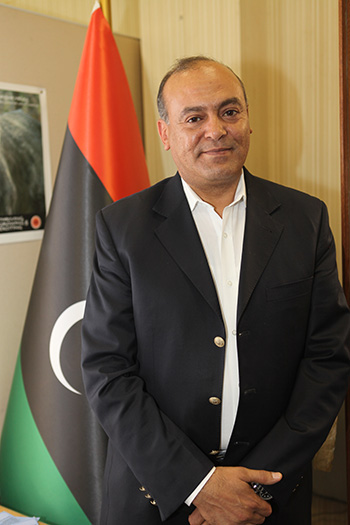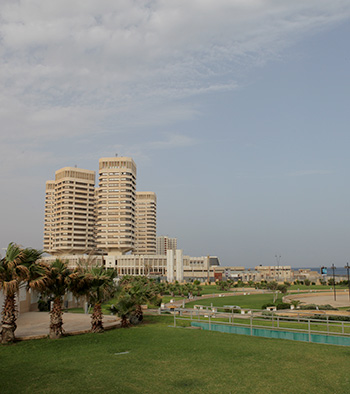Doing Business in Libya: General Business Outlook
Libya Top Stories
Doing business in Libya: General business outlook
Part of the Libyan business picture involves—among others—abound investments, with the state-owned Libya Africa Investment Portfolio (LAP) having an estimated $5 billion in assets, thought the fair value amount is still being estimated.

Doing business in Libya: General business outlook
By TK Maloy
TRIPOLI – Part of the Libyan business picture involves—among others—abound investments, with the state-owned Libya Africa Investment Portfolio (LAP) having an estimated $5 billion in assets, thought the fair value amount is still being estimated.
In an interview with Marcopolis, LAP’s managing director, Ahmed A. Kashadah, outlined some of the changes post-regime and the investment strategy going forward.

“We are totally independent now. Previously LAP was involved in many politically motivated investments. We have reviewed everything in our portfolio, including the investments not only in Africa but also in Europe. We needed to make sure that all the investments were feasible and that they would generate returns either in the short term or the long term,” Kashadah said. “We have been doing a lot of work evaluating all of these businesses and the business models that we have. We were able to identify the businesses that were based on political objectives and we decided to exit from these businesses if they were proven not to be feasible. However we did decide to continue with those investments started from political motives but found to be feasible, generating benefits and adding value for both nations, both Libya and the nation invested in.“
For LAP, Africa is a growing market and contrarian to some views its growth isn’t only in raw materials but also in technology investment.
“We don’t see Africa as a source of raw materials. We would like to see it as an opportunity to invest and develop different sectors. For example we are investing in technology in Africa, we believe there is a big market for technology to be developed and expanded in Africa,” Kashadah explained. “We are going to have a telecommunication business in Africa and a satellite business in Africa. We do see technology as a way of entering the African region as we see a lot of room for development in that sector.”
He added, “We are mainly investing in private equity in Africa. That in itself is very high risk. For the past few years we have been trying to reduce that risk by trying to make this portfolio healthier and more liquid. We do see risk as our main priority when we look into new investments… We are leaning towards a balanced portfolio in the coming future.”
“We don’t see Africa as a source of raw materials. We would like to see it as an opportunity to invest and develop different sectors. For example we are investing in technology in Africa, we believe there is a big market for technology to be developed and expanded in Africa,” explains Ahmed A. Kashadah from Libya Africa Investment Portfolio (LAP).
In a sign of continued optimism amid problems, Libya held its first “Global Entrepreneurship Week” last November.
Designed to introduce young people to the concept of entrepreneurship, Libya was hosting 2013 GEW along with Qatari-based Silatech, and was one of 120 countries participating in the event.
In other news, The Ministry of Tourism was working hard to increase Libya’s international profile at the November World Travel Market 2013 which was held in London last November.
“The main aim of our participation is to improve the international image of Libya,” Director of the Ministry’s Tourism Promotion Department, Zakariah Ahmed Abu Zaid, said in an interview with the Libya Herald, prior to the show.
“We want the world to see that Libya is working now, including its institutions and civil society organizations,” Zaid said.
Because of the ongoing security problems, Zaid explained that instead of marketing the tourism industry, as such, the exhibition offered an opportunity to raise Libya’s image and define its brand as a nation. The Libyan both at the World Travel Market featured not only hotel and tourism companies, but companies from business sectors across the board.
On the industry front, Libya is looking at the possible sale of a the Misrata steel plant and eight other state companies in an effort to increase efficiency in the industrial sectors by selling these operations to private ownership. This is part of an ongoing effort by the government – since the overthrow of Qaddafi – to attract foreign investment and expertise into the industry sector.
 At a Reuters Middle East Investment Summit, Industry Minister Suleiman al-Fitouri said, “We need to evaluate first, then we make the decision. I think the valuation will take some time, maybe three months.”
At a Reuters Middle East Investment Summit, Industry Minister Suleiman al-Fitouri said, “We need to evaluate first, then we make the decision. I think the valuation will take some time, maybe three months.”
The Misrata-based Libyan Iron and Steel Co. is one of the largest steelmakers in North-Africa, with a top capacity of 16 metric tons. Production has been lowered because of power shortages.
Fitouri conceded in an interview with Reuters that foreign investors had valid concerns about entering the country considering the security issue, but added that nevertheless there were companies still expressing interest.
In an economic vote of confidence, Emirates Airline restarted its passenger service to Tripoli in September “illustrating Libya’s importance in Emirates’ global network and the airline’s commitment to the country,” the air carrier said in a release.
According to Jean Luc Grillet, senior vice president, Emirates Commercial Operations for Africa, “We have been closely monitoring the situation in Libya and feel that the time is right to re-launch our services, which will help to support business, international trade and passenger travel to and from Tripoli, as well as strengthening the country’s overall infrastructure.”
The company added in its release: “Supporting the thriving trade between Tripoli and the rest of the world, Emirates has introduced a dedicated cargo service into Tripoli in May 2012. Emirates’ cargo division transports a variety of goods into Tripoli ranging from electronic goods from the Far East to drilling equipment from the US.”
Also, Qatar Airways announced in September an increase in capacity between Qatar and North Africa with flights to Tripoli and Casablanca going non-stop starting June 1st. Qatar Airways CEO Akbar Al Baker said that the re-introduction of these non-stop routes exemplified the airline’s commitment to North Africa.
“(This) is a significant step by Qatar Airways as we show our continued confidence in North Africa. This means more capacity and improved travel times to and from Tripoli and Casablanca to destinations across our network.”
In other recent positive news, International Hospitals Group, a large UK health-care provider, signed a deal worth a reported two-billion dinars, contracting the construction of nine health clinics.

Mohamed Alhanghri, a member of the Libyan Businessmen Council told Marcopolis: “We are aiming to return Libya to its previous status as a trading and transit zone to and from Europe, after this role was neglected for the past 48 years. We also aim to have several trading and exchanging sea ports between Libya, Europe and America, the traditional trading partners.”
What remains at issue is not only the security issue, but having standard practices in place, so foreign businesses know what the rules are. Also a number of businesses have voiced objections to the cumbersome nature of the bureaucracy evident in the post-revolutionary government.
Libya needs to adopt a large scale privatization for the FDI to seriously consider entering the country. And the government needs to definitely resolve the security issue – no easy task — and has to adopt administrative and structural reforms, cut the red tape and open up across the various sectors for the foreign investment.
In the IMF Article IV consultation released last spring, the fund reported that a transparent and accountable system for was needed to prevent entrenched corruption:
“The authorities need to articulate and then implement a strategic vision for economic development which includes steps to set up a governance framework linked to transparency and accountability, including anti-corruption elements. Sustainable growth requires a business environment that is conducive to private sector development.”
In the meanwhile, with questions of who has the power in Libya — in sectors such as oil — businesses may find themselves dealing with ad-hoc partners such as al-Jathran in the Cyrenaica region.
As strange as this may seem, it is akin to the separate deals struck with the autonomous Kurdistan region in the Federal Republic of Iraq, over the objection of the Iraqi central government
As noted earlier in this article, when there is money to be made many businesses become creative in their entry in any respective economy.
Particularly a resources rich nation such as Libya which is still undergoing growing pains as the nation rebuilds its government and business sectors from a zero starting point.